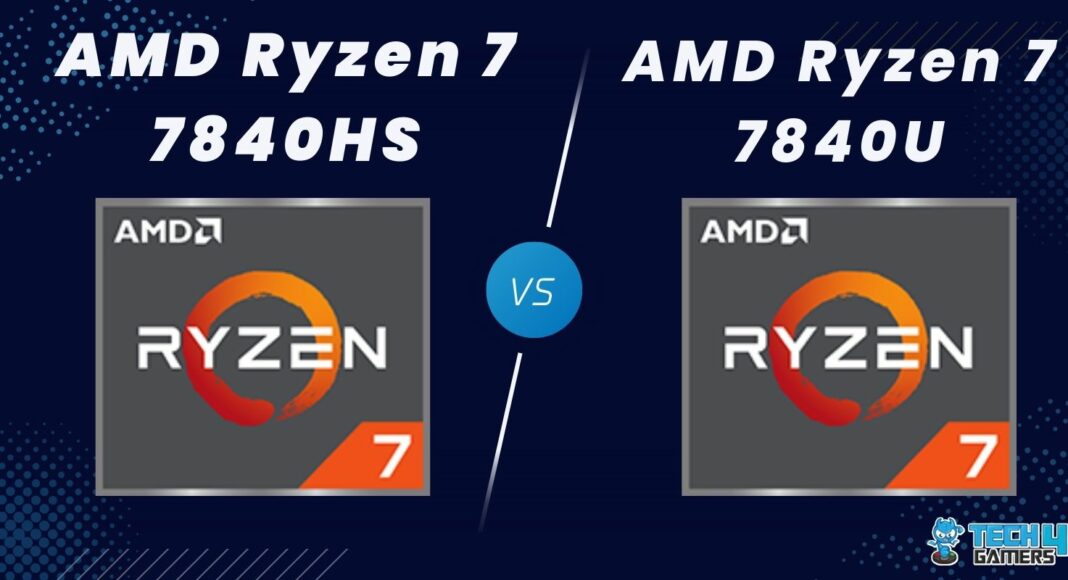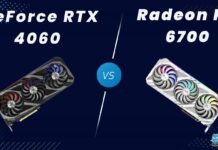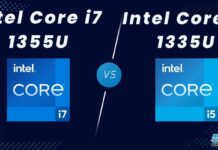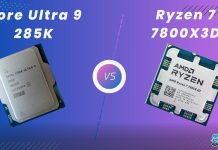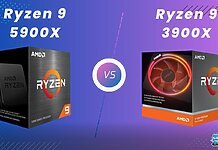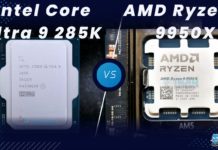AMD Ryzen 7 7840U
Rated: 8.5/10
AMD Ryzen 7 7840HS
Rated: 7/10
Pros And Cons
| CPU | Pros | Cons |
|---|---|---|
| AMD Ryzen 7 7840U | ✅ Better Single-core Performance ✅ Lower TDP | ❌ Older Manufacturing Node ❌ Higher Price |
| Ryzen 7 7735HS | ✅ Better Multicore Performance ✅ Higher Base Clock | ❌Higher TDP ❌Weaker Single-core results |
- Firstly, the Ryzen 7 7840U shines in our single-core performance benchmarks by 2.9%, while the Ryzen 7 7840HS excels in multi-core tasks by 19.3% on average, ensuring better results across various of our benchmarks.
- Both chips offer comparable clock speeds, with Ryzen 7 7840HS and Ryzen 7 7840U delivering snappy and efficient multitasking at a 3.8 GHz base clock and 5.1 GHz boost clock, a 3.3 GHz base clock, and a 5.1 GHz boost clock, respectively.
- Supporting up to 256GB of DDR5-5600 and LPDDR5x-7500 memory, both processors cater to data-intensive applications, delivering ample bandwidth and faster data access.
- We analyzed that the Ryzen 7 7840U boasts a configurable TDP of 15-30W, ensuring cooler and power-efficient performance, while the Ryzen 7 7840HS requires a higher 35-54W TDP.
Comparison Table
| Key Specifications | Ryzen 7 7840HS | Ryzen 7 7840U |
|---|---|---|
| Release Date | January 4, 2023 | May 3, 2023 |
| Device Type | Laptop | Laptop |
| Instruction Set | x86-64 | x86-64 |
| Integrated GPU | Radeon 780M | Radeon 780M |
| Total Cores | 8 | 8 |
| Total Threads | 16 | 16 |
| L1 Cache | 64K (per core) | 64K (per core) |
| L2 Cache | 1MB (per core) | 1MB (per core) |
| GPU Base Clock | 1500 MHz | 1500 MHz |
| GPU Boost Clock | 2900 MHz | 2700 MHz |
| Cuda Cores | 768 | 768 |
| Execution Units | 12 | 12 |
Ryzen 7 7840U Vs Ryzen 7 7840HS
As we delve into the architectural differences between AMD Ryzen 7 7840U and Ryzen 7 7840HS, a deeper understanding of their design nuances emerges. These distinctions lay the groundwork for a comprehensive comparison, giving valuable insights into how each processor’s engineering choices influence their overall performance and efficiency.
- Process Node: Embracing the forefront of semiconductor technology, both the Ryzen 7 7840HS and Ryzen 7 7840U are engineered using a state-of-the-art 4nm fabrication process, exemplifying AMD’s dedication to pushing innovation boundaries.
- Clock Speed: Unleashing remarkable clock speeds, the Ryzen 7 7840HS and Ryzen 7 7840U deliver swift performance with a base clock of 3.8 GHz, 3.3 GHz, and an impressive boost clock of 5.1 GHz, respectively, ensuring seamless multitasking and responsive computing.
- Memory Support Variation: Catering to data-hungry applications, the Ryzen 7 7840HS, and Ryzen 7 7840U support up to 256GB of high-bandwidth DDR5-5600 and LPDDR5x-7500 memory, enabling blazing-fast data access and efficient multitasking.
- TDP: Moreover, the Ryzen 7 7840U shines with a configurable lower TDP of 15-30W, while the Ryzen 7 7840HS also demands a configurable TDP of 35-54 W, proving the earlier to be more power efficient.
- Supported Technologies: Expanding their capabilities, both the Ryzen 7 7840HS and Ryzen 7 7840U offer ECC Memory support, empowering users with enhanced error correction capabilities for critical computing tasks.
Step into the world of high-performance computing as we unravel the face-off between AMD Ryzen 7 7840U vs Ryzen 7 7840HS processors. In this detailed exploration, we’ll closely examine their unique specifications and put them to the test with real-world performance benchmarks.
Performance Benchmarks
Through rigorous performance benchmarks, we unveil the true potential of the Ryzen 7 7840U and Ryzen 7 7840HS, exploring how they handle various computing tasks and real-world scenarios. These benchmark tests provide a comprehensive outlook on their capabilities, shedding light on which processor excels in specific applications and workloads.
Cinebench R23 (Single-Core)
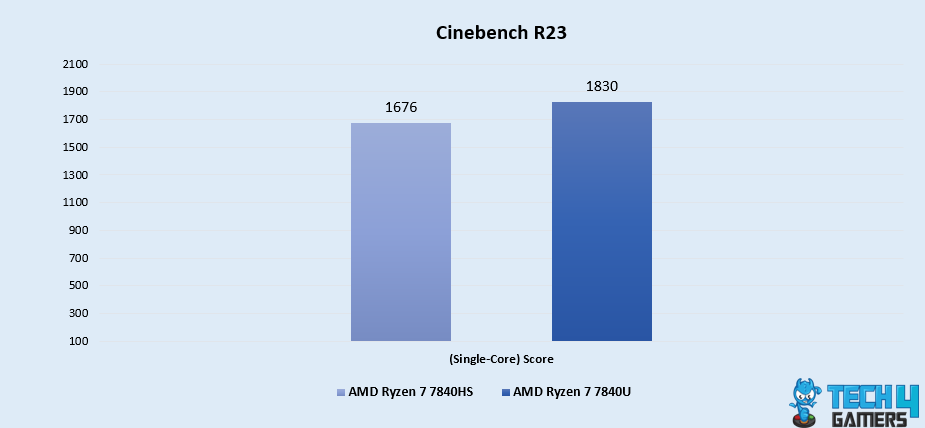
- Firstly, in our analysis of the Cinebench performance, we noticed that the Ryzen 7 7840U exhibits a 9% lead, achieving a score of 1830, while the Ryzen 7 7840HS trails at 1676, showcasing the former’s better single-core performance.
Cinebench R23 (Multi-Core)
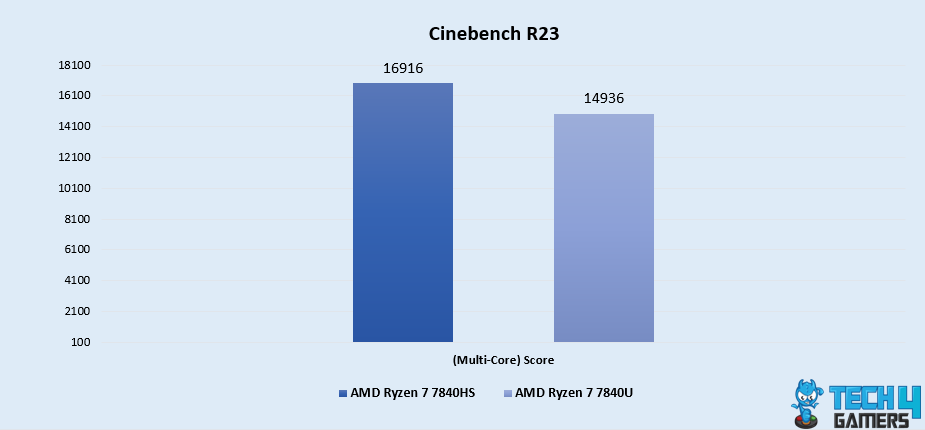
- In multi-core performance, the Ryzen 7 7840HS takes a 13% lead, scoring 16916, outperforming the Ryzen 7 7840U’s score of 14936, demonstrating its superior multitasking capabilities.
Geekbench 5 (Single-Core)
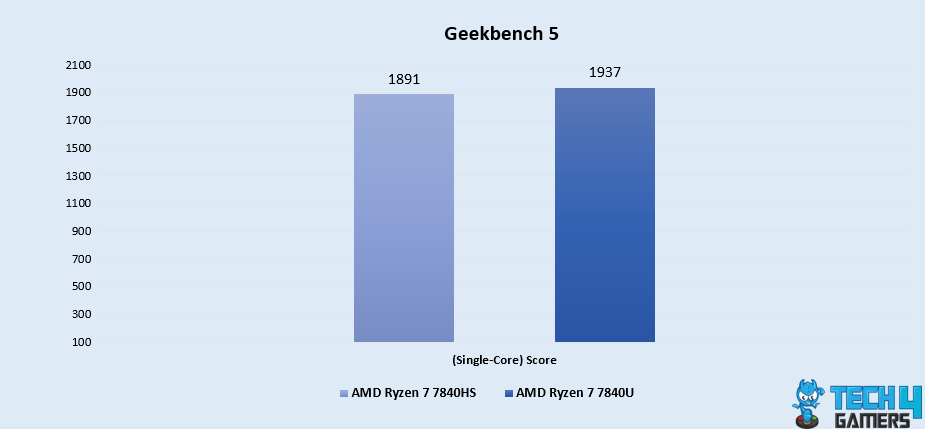
- While tackling single-core tasks, we observed that the Ryzen 7 7840U holds a slight 2% advantage, reaching a score of 1937, while the Ryzen 7 7840HS scores 1891, highlighting the former’s marginal lead in single-core processing.
Geekbench 5 (Multi-Core)
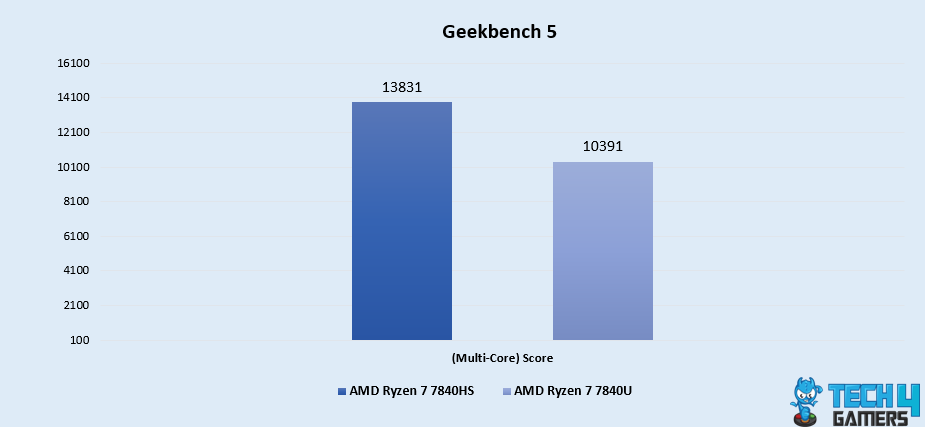
- When it comes to the realm of multitasking, the Ryzen 7 7840HS maintains a significant 33% lead, scoring 13831, while Ryzen 7 7840U scores 10391, reinforcing its superior performance in handling parallel tasks.
Verdict
AMD Ryzen 7 7840U: In our assessment, the Ryzen 7 7840U showcases an advantage in single-core performance across various benchmarks, whereas the Ryzen 7 7840HS impresses with its lead in multi-core performance, delivering superior results.
AMD Ryzen 7 7840HS: In our benchmarks, the AMD 7 7840HS demonstrates superior multicore performance, highlighting its strength in multitasking scenarios. This indicates its superiority in handling demanding workloads efficiently.
We would recommend users opt for the AMD Ryzen 7 7840HS as it sports a better Multicore performance in comparable TDP and better temperatures and levels.
More From Ryzen 7 7840U:
More From Ryzen 7 7840HS:
Thank you! Please share your positive feedback. 🔋
How could we improve this post? Please Help us. 😔
[Comparisons Expert]
Shehryar Khan, a seasoned PC hardware expert, brings over three years of extensive experience and a deep passion for the world of technology. With a love for building PCs and a genuine enthusiasm for exploring the latest advancements in components, his expertise shines through his work and dedication towards this field. Currently, Shehryar is rocking a custom loop setup for his built.
Get In Touch: shehryar@tech4gamers.com


